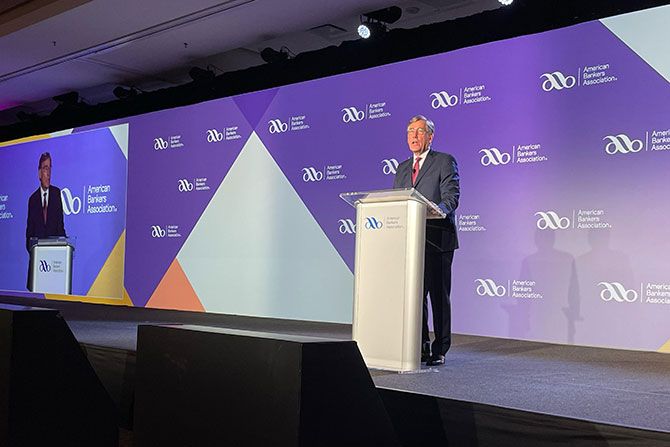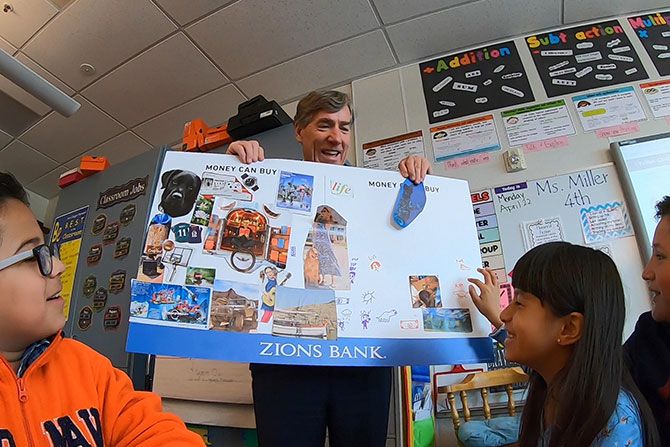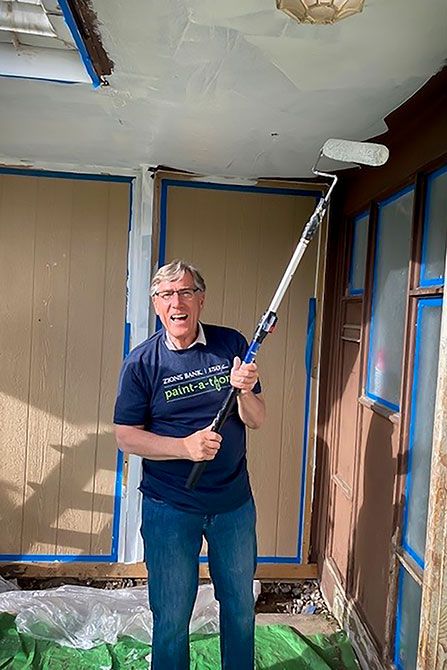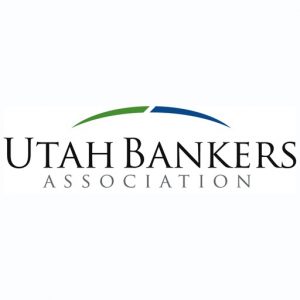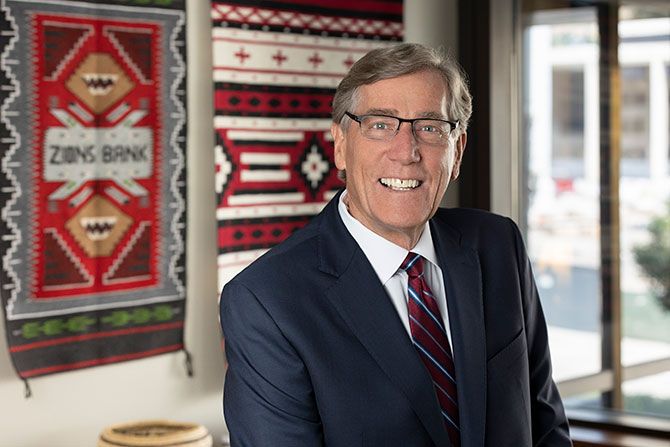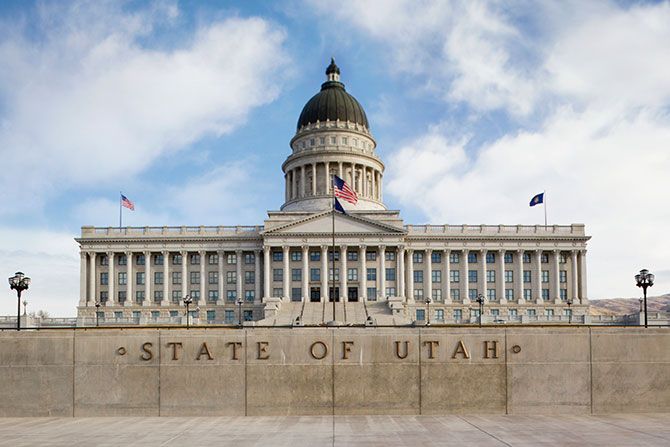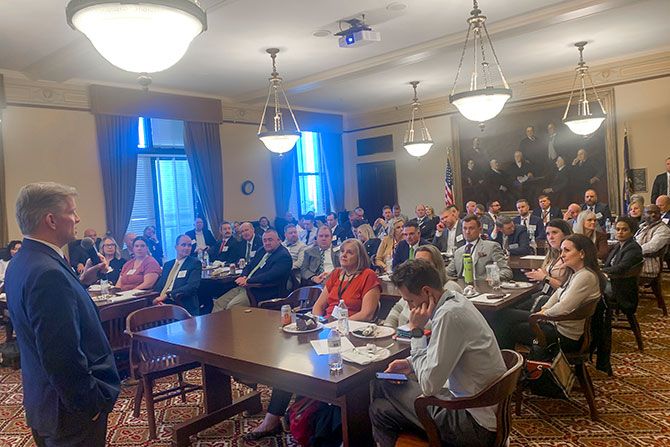In 1990, Scott Anderson left a promising career at Bank of America to return to Utah and work at his hometown bank. More than three decades later, he now retires as president and CEO, leaving Zions Bank, the banking industry and the larger community immeasurably transformed by his leadership.
After receiving degrees from Columbia University and Johns Hopkins University, Anderson began his career in San Francisco as part of Bank of America’s international banking division. He was later assigned to Tokyo, where he spent seven years before returning to San Francisco to establish a small-business banking program and manage the company’s main office in the city.
“I loved Bank of America. It was a terrific opportunity,” Anderson said. “But I really welcomed the opportunity to come home.”
Anderson had been a customer of Zions Bank since the age of 14, when he opened an account at the 7th East branch to deposit his paychecks from Bratten’s Seafood Grotto, where he worked as a busboy.
He brought to his Zions Bank office a bust of Amadeo Giannini, the Italian immigrant who founded Bank of America in San Francisco in the early 1900s. Following the 1906 earthquake that leveled the city, Giannini set up a makeshift desk on top of a barrel and loaned money to those who needed it to rebuild. He later boasted that every earthquake loan he made was repaid.
Giannini’s daughter, Claire, gave Anderson the bust when he left Bank of America to remind him, he said, that the main value of money is to help people and their community grow. Bolstering the success of individuals and Main Streets would likewise be a central focus of Anderson’s career.
In Anderson’s early years at Zions Bank, he established a successful retail banking division and helped expand the branch and ATM network, which was half its current size. He also led Zions in becoming one of the top U.S. Small Business Administration (SBA) 7(a) lenders in Utah, and later in Idaho.
Anderson was named Zions Bank’s president and CEO in January 1998, succeeding Harris Simmons, current chairman and CEO of Zions Bancorporation.
Over more than a quarter-century at its helm, Anderson developed the legacy institution into a full-service commercial bank with a strong presence in Idaho and later in Jackson, Wyoming. During his tenure, the bank’s assets have grown from $6 billion to $22.8 billion.
Anderson also became a powerful voice for the banking industry locally and nationally. In the early 2000s, he worked with industry associations to level the taxation playing field between banks and credit unions. He received the Utah Bankers Association’s Distinguished Banker Award in 2010. From October 2021 to October 2022, he chaired the American Bankers Association, supporting the nation’s recovery from the pandemic while driving economic growth.
“He’s so focused on helping the people he leads, and I think that’s at the heart of all the amazing things he’s accomplished,” Howard Headlee, UBA president and CEO, said at the time of Anderson’s appointment as chair.
Anderson was instrumental in bringing major economic development initiatives to Utah, including helping establish the World Trade Center Utah; the Utah Science, Technology and Research Initiative (USTAR); and other major community organizations. As chairman of the Board of Directors of United Way of Salt Lake, he created the Financial Stability Council that led to the creation of the “Earn It. Keep It. Save It.” initiative.
Recognizing the power of the arts to re-energize communities, he’s also supported public art programs and revitalization projects that stimulate economic development, including the nationally renowned Utah Shakespeare Festival.
During the COVID-19 pandemic, Anderson led Zions Bank’s round-the-clock efforts to get Paycheck Protection Program loans to ailing businesses while joining forces with banking and credit union leaders to address financial challenges facing consumers and businesses. As chair of the Utah Coronavirus Economic Response Task Force, he initiated town hall meetings to educate consumers and business owners about financial resources and made policy recommendations to federal, state and local governments.
In Utah, PPP loans through Zions Bank helped retain more than 150,000 jobs and protected more than 10,000 Utah businesses. And more than 30% of the loans went to businesses in majority/minority and low- to moderate-income census tracts.
Anderson’s leadership has been focused on creating opportunities for people of all backgrounds and at all rungs of the economic ladder. In 2015, he launched the Women’s Leadership Institute (WLI), now a self-sustaining 501(c)3, which Zions Bank continues to support. Zions Bank was also a founding sponsor of Somos, a Utah Hispanic Chamber of Commerce foundation dedicated to strengthening Utah’s Latino community through education.
He has also worked to support veterans and active military and their families through banking services, employment opportunities, community partnerships and recognition programs. Because of his military-friendly employment efforts, Zions Bank was recognized in 2014 with the Secretary of Defense Employer Support Freedom Award.
From early on in his career, Anderson has emphasized the importance of personal relationships, community involvement and civic leadership. He’s served on and chaired numerous civic, business and nonprofit boards, including Intermountain Healthcare, University of Utah’s Kem C. Gardner Policy Institute, the Huntsman Cancer Foundation, Envision Utah, and Silicon Slopes. And he’s encouraged Zions employees to do the same, fostering a culture of community involvement where employees regularly participate in local nonprofit organizations, volunteer in their communities and serve on boards.
Anderson is reliably among the dozens of Zions employees who volunteer in schools each spring and fall to teach kindergarten through 12th-grade students their financial ABCs in honor of National Teach Children to Save Day and National Get Smart About Credit Day — annual outreach events sponsored by the American Bankers Association. Zions Bank volunteers have collectively taught more than 232,000 students since 2002.
Each spring, he’s rolled up his sleeves to scrape, paint and landscape homes as part of the bank’s annual Paint-a-Thon. He’s presided over the service project for most of its 31 years, with more than 30,000 volunteer participants painting 1,287 homes. Not counting the dollar value of volunteer hours through the years, the bank has donated more than $1.4 million toward beautifying homes.
A community builder, Anderson is adept at bringing disparate groups together to tackle important public policy issues, from affordable housing to economic opportunity. He was a catalyst in developing a series of community compacts that found compromise and “win-win” positions on difficult societal issues like immigration, clean air and race relations.
“Scott has been a community leader without equal, contributing his time, talents and prodigious energy in tackling important challenges, both locally and nationally,” said Harris Simmons, Zions Bancorporation’s chairman and CEO.
Anderson was recognized, alongside Simmons, as a “Giant in Our City” by the Salt Lake Chamber of Commerce in 2013. On the heels of receiving Utah Days of ‘47’s “Pioneers of Progress” award in 2022, he led Zions Bank in commemorating its 150th anniversary in 2023, illuminating a pioneering legacy of community banking amplified by his leadership.
With his April retirement, Anderson, 77, will become non-executive chairman of Zions Bank, maintaining a part-time role with the organization in helping to serve the needs of our community.
Paul Burdiss, Zions Bancorporation’s chief financial officer since 2015, will succeed Anderson as president and CEO of Zions Bank. Burdiss was previously corporate treasurer at SunTrust Banks and, before that, an executive vice president, treasurer and director of investor relations at Comerica.
